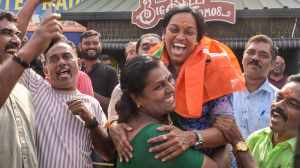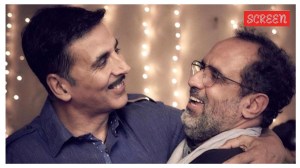When Did You Really Feel Free?
Sixty five years after Indias independence,freedom has become a free-to-interpret idea revelled in,enjoyed,challenged in myriad ways,even resisted and resented by some. In urban India today,freedom has numerous,polarised definitions mostly personal. Talk speaks to a cross section of Indians in different cities,age groups and professions about that particular moment in their lives when they felt unbound and free
Sixty five years after Indias independence,freedom has become a free-to-interpret idea revelled in,enjoyed,challenged in myriad ways,even resisted and resented by some. In urban India today,freedom has numerous,polarised definitions mostly personal. Talk speaks to a cross section of Indians in different cities,age groups and professions about that particular moment in their lives when they felt unbound and free
Deepak Kashyap
Kite Maker,Old Delhi
When I see my kites soar in the sky,I feel Im flying with them. Thats freedom for me. I have been making kites for 30 years now; my father was in the same business, says Kashyap,who makes kites in a small dingy room in the winding lanes of Lal Kuan in Old Delhi. Every year on August 15,the gruff 37-year-old goes to the roof to spot his kites among the hundreds that dot the sky. His fingers are a mottled brown,with a thick crust of local glue forming a perpetual layer on the skin. Kashyap makes around two thousand paper kites every day. Except on August 15,when he flies high with them.
Sohrab Pant
Stand-up Comedian,Pune
About five months ago,when I was performing at the India Habitat Centre in Delhi,I joked about how Doordarshans version of the Mahabharata was like the ultimate rave party of 3,000 BC. I had people come up to me and appreciate the joke. Even though I was a little skeptical while performing it and did expect a few from the audience to get ticked off,I was pleasantly surprised at how well they took the joke. That was the time I really felt free. Earlier,there were so many implied restrictions on what you can talk about and what you must avoid during a performance,but now is the coolest time for stand-up comedy in India, says the 30-year-old.
Pramod Kumar
ATM Security Guard,
New Delhi
Azadi kahan mili hai mujhe? (Where have I found freedom?), says 47-year old Kumar,a B Com graduate,who works as a security guard outside a bank ATM in Delhi. Kumar lost both his parents at a young age and was burdened with a set of responsibilities. He moved from Uttar Pradesh to Delhi but his dreams of landing a good job never came true. Now a father of three,Kumar says his job doesnt even ensure his children proper education,good food and clothes.
Haseena Hussain
Acid Attack Victim,
Bengaluru
I felt really free when I got empowered by my mobility lessons as an accident victim who had become visually challenged and disabled. After I was burnt with acid,I had never even dreamt that I would be able to walk on my own,live alone when necessary,cook for myself and my family,and indepedently handle my own chores. Today,I can hail a cab,use a computer and do whatever I wish,without asking for help for every small thing. This is freedom, says the 32-year-old,who was doused with acid by her employer in 1999 because she rejected his advances. Haseena,who now works as a Central government clerk,went through almost two dozen cosmetic and other surgeries,and many unsuccessful attempts at corneal transplant,till she decided to take mobility classes for disabled people,which set her free.
Raghunath Medge
President,Dabbawala
Association,Mumbai
Its been 65 years since India gained independence but for people like me,there is no freedom. Like everyone else who moved to this city for a better life,I also came here with similar dreams. Ive worked hard all my life but it feels like the rich just keep getting richer,while the poor keep getting poorer, rues 57-year-old Megde,adding that even as the country has become a senior citizen,citizens like him still dont feel truly free.
Nikhil Kanetkar
Former Badminton
Player,Pune
The feeling of living in a free nation comes whenever I am on the badminton court. But during the 1998 Commonwealth Games in Kuala Lumpur,the mens singles team comprising myself,Pulela Gopichand and Abhinn Shyamgupta faced tough competition against the England team. Their players were good but very snobbish. It was a close encounter and we eventually won. That one moment when we were up on the podium with the silver medal, made me feel free, says 33-year-old Kanetkar.
Sunil
Balloon Seller,New Delhi
I feel like a free man every time I see a smile on the face of little children when I hand them a balloon. I also feel free when I am able to earn enough to manage meals and other sundry needs of my family, says 38-year-old Sunil,who has been selling balloons at India Gate for 20 years now. Sunils wife has not been able to conceive a child for the last seven years they have been married.
Ma Faiza
DJ,Pune
I organised a party in Mumbai called Q Nites,on July 2 last year the third anniversary of the Supreme Court verdict on Section 377 and it was at that time that I felt most free. We expected about 500 guests but 1,200 people turned up and we had to turn down many. It was open for all the queer community and its supporters. It was such an amazing group of people, says 42-year-old Ma Faiza.
Shalmali Kholgade
Playback Singer,
Mumbai
My first encounter with Bollywood (singing Pareshaan in Ishaqzaade) proved to be a rather life-changing experience. Post the song,the attention I received was overbearing. I felt like I was being spoken about more than I deserved. Soon after,when I went to my aunts place in Kolhapur for four days,there was no mention of Pareshaan,Bollywood or anything pertaining to my music career. I finally felt like I could breathe. It was liberating not to be the centre of attention, says the 22-year-old.
Mercy Tetseo
Vocalist for Tetseo
Sisters,Kohima
The time I feel free is when,away from the states (Nagaland) upheavals,I am on stage and can sing songs about subjects that are a taboo in the society. The place that we live in puts too many restrictions on us as women,and as musicians. But it is singing about abuse,incest,prejudice and empowerment that gives me a sense of freedom, says Mercy Tetseo,29,of Kohima-based band Tetseo Sisters,mostly known to sing Li songs,the folk songs of the Chakhesang Naga tribe,accompanied by a one-string instrument called tati.
Gaurav Sahai
Organic Farmer,Landran
(near Chandigarh)
I associate the word freedom with two life-changing instances. First,in 2005,when I quit my job at Hewlett- Packard in the US and came back to India. Then,by choosing to be out of the drudgery of big-city life,opting out of the rat race and leading a simple life as a farmer. I chose to live a free life against all odds. I feel free to face the consequences of my choices and I cherish this freedom to be with the people I wanted to be with,and lead a life of my choice, says 37-year-old Sahai,who cultivates a small organic farm and also runs an organic food store,Sattva.
Amal Allana
Chairperson,National School of Drama,New Delhi
I had been grappling with my own predicament of the East versus West influences in my life,when I started creating a play called Begum Barve in 1996,about an androgynous actor,a man who wanted to be a woman. As it progressed,I found myself developing a deeper understanding of the meaning of artistic freedom,how I like many theatre artistes am an amalgamation of fractured influences,whether in terms of gender or political sensibility. We are not grounded in one reality but are powered by opposing forces that operate simultaneously. This realisation liberated me, says Allana,who was born in 1947.
Manisha Gera Baswani
Artist,New Delhi
I felt free after I finished my art studies and was ready to face the world as an artist. I was free in my studio to express myself the way I wanted to,and there was no turning away. Till then,I was in an institutional set-up. Learning art is like learning grammar and writing poetry. One has to learn the nuances and only then can they afford to write an ungrammatical prose, says the 45-year-old artist.
- 01
- 02
- 03
- 04
- 05































